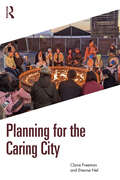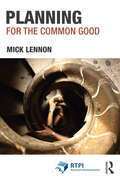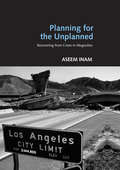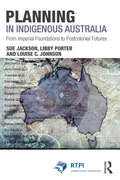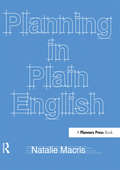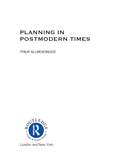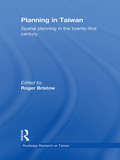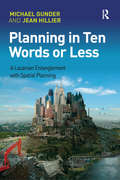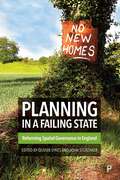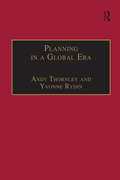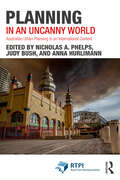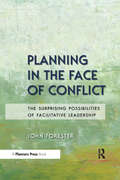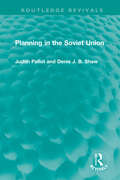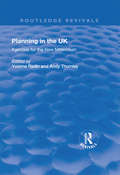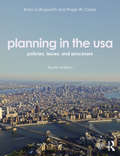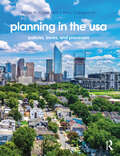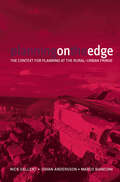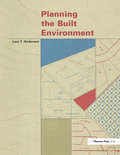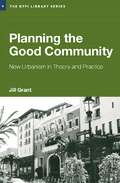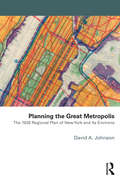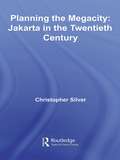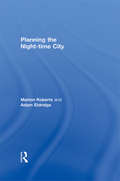- Table View
- List View
Planning for the Caring City
by Claire Freeman Etienne NelAs the world has become increasingly urbanised and planetary well-being ever more threatened, questions have emerged over just what the priorities should be for how we live in cities. Clearly for many the current ways of planning and managing city environments are not working, given so many of their human and non-human inhabitants struggle on a daily basis to maintain their well-being and survival. Different approaches to city development are crucial if they are to be inclusive places where all can thrive. Ensuring that cities are safe and sustainable and provide a level of care for all their residents places a significant mandate on those who manage cities and on planners in particular. This book examines all the parts of the city where care needs to be incorporated, how we plan, create nurturing environments, include all who live there, build sensitively, support meaningful livelihoods, and enable compassionate governance. With planners in mind this book examines why care is needed in the urban environment, and drawing on real world examples examines how it can be applied in an effective and empowering fashion.
Planning for the Common Good (RTPI Library Series)
by Mick LennonAppeals to the ‘common good’ or ‘public interest’ have long been used to justify planning as an activity. While often criticised, such appeals endure in spirit if not in name as practitioners and theorists seek ways to ensure that planning operates as an ethically attuned pursuit. Yet, this leaves us with the unavoidable question as to how an ethically sensitive common good should be understood. In response, this book proposes that the common good should not be conceived as something pre-existing and ‘out there’ to be identified and applied or something simply produced through the correct configuration of democracy. Instead, it is contended that the common good must be perceived as something ‘in here,’ which is known by engagement with the complexities of a context through employing the interpretive tools supplied to one by the moral dimensions of the life in which one is inevitably embedded. This book brings into conversation a series of thinkers not normally mobilised in planning theory, including Paul Ricoeur, Alasdair MacIntyre and Charles Taylor. These shine light on how the values carried by the planner are shaped through both their relationships with others and their relationship with the ‘tradition of planning’ – a tradition it is argued that extends as a form of reflective deliberation across time and space. It is contended that the mutually constitutive relationship that gives planning its raison d’être and the common good its meaning are conceived through a narrative understanding extending through time that contours the moral subject of planning as it simultaneously profiles the ethical orientation of the discipline. This book provides a new perspective on how we can come to better understand what planning entails and how this dialectically relates to the concept of the common good. In both its aim and approach, this book provides an original contribution to planning theory that reconceives why it is we do what we do, and how we envisage what should be done differently. It will be of interest to scholars, students and practitioners in planning, urban studies, sociology and geography.
Planning for the Unplanned: Recovering from Crises in Megacities
by Aseem InamFirst published in 2005. Routledge is an imprint of Taylor & Francis, an informa company.
Planning in Divided Cities (Real Estate Issues Ser. #55)
by Mike Morrissey Frank GaffikinDoes planning in contested cities inadvertedly make the divisions worse? The 60s and 70s saw a strong role of planning, social engineering, etc but there has since been a move towards a more decentralised ‘community planning’ approach. The book examines urban planning and policy in the context of deeply contested space, where place identity and cultural affinities are reshaping cities. Throughout the world, contentions around identity and territory abound, and in Britain, this problem has found recent expression in debates about multiculturalism and social cohesion. These issues are most visible in the urban arena, where socially polarised communities co-habit cities also marked by divided ethnic loyalties. The relationship between the two is complicated by the typical pattern that social disadvantage is disproportionately concentrated among ethnic groups, who also experience a social and cultural estrangement, based on religious or racial identity. Navigating between social exclusion and community cohesion is essential for the urban challenges of efficient resource use, environmental enhancement, and the development of a flourishing economy. The book addresses planning in divided cities in a UK and international context, examining cities such as Chicago, hyper-segregated around race, and Jerusalem, acting as a crucible for a wider conflict. The first section deals with concepts and theories, examining the research literature and situating the issue within the urban challenges of competitiveness and inclusion. Section 2 covers collaborative planning and identifies models of planning, policy and urban governance that can operate in contested space. Section 3 presents case studies from Belfast, Chicago and Jerusalem, examining both the historical/contemporary features of these cities and their potential trajectories. The final section offers conclusions and ways forward, drawing the lessons for creating shared space in a pluralist cities and addressing cohesion and multiculturalism. • Addresses important contemporary issue of social cohesion vs. urban competitiveness • focus on impact of government policies will appeal to practitioners in urban management, local government and regeneration • Examines role of planning in cities worldwide divided by religion, race, socio-economic, etc • Explores debate about contested space in urban policy and planning • Identifies models for understanding contested spaces in cities as a way of improving effectiveness of government policy
Planning in Indigenous Australia: From Imperial Foundations to Postcolonial Futures (RTPI Library Series)
by Louise C. Johnson Sue Jackson Libby PorterPlanning in settler-colonial countries is always taking place on the lands of Indigenous peoples. While Indigenous rights, identity and cultural values are increasingly being discussed within planning, its mainstream accounts virtually ignore the colonial roots and legacies of the discipline’s assumptions, techniques and methods. This ground-breaking book exposes the imperial origins of the planning canon, profession and practice in the settler-colonial country of Australia. By documenting the role of planning in the history of Australia’s relations with Indigenous peoples, the book maps the enduring effects of colonisation. It provides a new historical account of colonial planning practices and rewrites the urban planning histories of major Australian cities. Contemporary land rights, native title and cultural heritage frameworks are analysed in light of their critical importance to planning practice today, with detailed case illustrations. In reframing Australian planning from a postcolonial perspective, the book shatters orthodox accounts, revising the story that planning has told itself for over 100 years. New ways to think and practise planning in Indigenous Australia are advanced. Planning in Indigenous Australia makes a major contribution towards the decolonisation of planning. It is essential reading for students and teachers in tertiary planning programmes, as well as those in geography, development studies, postcolonial studies, anthropology and environmental management. It is also vital reading for professional planners in the public, private and community sectors.
Planning in Plain English: Writing Tips for Urban and Environmental Planners
by Natalie MacrisIn this volume, the author draws from more than a decade of editing experience to explain how to craft clear, understandable, and highly readable planning documents. The author suggests ways to overcome planners' most common writing foibles: acronymns, jargon, and overuse of the passive voice. And the author provides handy lists to transform mushy nouns into powerful verbs, pare down bloated sentences, and translate ""bureaucratese"" into everyday language. The author even includes practice exercises designed to help you recognize and overcome bad writing habits. But even the best writing skills won't help if your document is organized poorly and aimed at the wrong audience.The author also explains why it's essential to know who your readers are before you start writing and how to organize your work so that it will be easy to understand and use."
Planning in Postmodern Times (RTPI Library Series)
by Philip AllmendingerPostmodern social theory has provided significant insights into our understanding of society and its components. Key thinkers including Foucault, Baudrillard and Lyotard have challenged existing ideas about power and rationality in society. This book analyses planning from a postmodern perspective and explores alternative conceptions based on a combination of postmodern thinking and other fields of social theory. In doing so, it exposes some of the limits of postmodern social theory while providing an alternative conception of planning in the twenty-first century.This title will appeal to anyone interested in how we think and act in relation to cities, urban planning and governance.
Planning in Taiwan: Spatial Planning in the Twenty-First Century (Routledge Research on Taiwan Series)
by Roger BristowAs a newly industrialised country with highly successful economic growth and political liberation in a short period of time, Taiwan has been viewed as a model for other aspiring countries and regions. This volume focuses on the connection between planning institution and practice and the country’s future in terms of political institutions and economic and environmental sustainability. The book starts by providing a history of planning in Taiwan and situates contemporary Taiwanese planning in the wider global context. The contributors go on to cover challenges to planning, urban change, legal planning, land problems, the development of industrial land, community planning, conservation, ecological land use, planning for natural disasters and transportation planning. The conclusion discusses the challenges for Taiwan in the twenty-first century. Planning in Taiwan will be of interest to students and academics working on comparative planning, development and politics, urban studies and conservation.
Planning in Ten Words or Less: A Lacanian Entanglement with Spatial Planning
by Michael Gunder Jean HillierThis book takes a Lacanian, and related post-structuralist perspective to demythologize ten of the most heavily utilised terms in spatial planning: rationality, the good, certainty, risk, growth, globalization, multi-culturalism, sustainability, responsibility and 'planning' itself. It highlights that these terms, and others, are mere 'empty signifiers', meaning everything and nothing. Based on international examples of planning practice and process, Planning in Ten Words or Less suggests that spatial and urban planning is largely based on the construction and deployment of ideological knowledge claims.
Planning in a Failing State: Reforming Spatial Governance in England
by Olivier Sykes and John SturzakerThis topical, edited collection analyses the state of the planning system in England and offers a robust, evidence-based review of over a decade of change since the Conservative-led coalition government came to power. With a critique of ongoing planning reforms by the UK government, the book argues that the planning system is often blamed for a range of issues caused by ineffective policy making by government. Including chapters on housing, localism, design, zoning and the consequences of Brexit for environmental planning, the contributors unpick a complicated set of recent reforms and counter the claims of the think-tank-led assault on democratic planning.
Planning in a Global Era (Urban and Regional Planning and Development Series)
by Andy ThornleyGlobalization was the buzzword of the last decade. Advances in communication technology, computing and air travel have all contributed to the establishment of what has been referred to as a 'network society' that encompasses the globe. Such arguments clearly have a significance on planning - an activity which has been concerned with controlling and shaping the use of space. This volume brings together contributions from across the world in order to address some of the questions that arise from such global changes. The opening section addresses the globalization debate directly, raising some theoretical issues and exploring the planning implications across a range of world cities. This is followed by an exploration of the way the theoretical debate about planning may need to advance to encompass contemporary forces. A number of more specific accounts addressing the need for adaptation are offered. The final section focuses on two aspects - housing and sustainability - which persist as 'wicked problems' and are likely to remain at the top of the agenda in the third millennium.
Planning in an Uncanny World: Australian Urban Planning in an International Context (RTPI Library Series)
by Nicholas A. Phelps Judy Bush Anna HurlimannThis book places Australian conditions and urban planning centrally within comparative analysis of planning systems and cultures around the world to address issues including urban governance, climate change, transportation planning, regional development and migration planning. Australian urban conditions and their associated planning responses can and often have been seen as unique or exceptional. They are seldom discussed in the same breath as conditions and associated planning systems internationally. Yet, as well as being somewhat different from those elsewhere in the world, Australian urban conditions and planning responses are also somewhat similar. They are uncanny – strangely familiar yet unfamiliar. In this book, Australian urban conditions, and their planning policies and practices are informally compared and contrasted with those existing internationally. If Australian urban planning policy and practice have had limited influence internationally, the partial familiarity of challenges posed by its urban conditions ensure that Australia is a more important global reference point for scholarship and practice than commonly is appreciated. In this book the authors assert the potential and actual originality of urban planning scholarship arising from the Australian context. It will be useful for students and faculty, planners working in Australia, as well as anyone interested in international planning debates.
Planning in the Face of Conflict: The Surprising Possibilities of Facilitative Leadership
by John F ForesterBikers and hikers. Sex workers and social conservatives. Agencies and activists. The people involved in planning for a site—or a community—can be like the Hatfields and McCoys. And the process brings them together face to face and toe to toe. How can planners take conflicted communities from passionate demands to practical solutions? Facilitative leadership offers helpful answers. Cornell University’s John Forester has produced a dozen profiles of planning practitioners known for their successes in helping communities turn contentious conflicts into practical consensus. This remarkable book tells their stories in their own words. Lisa Beutler shows the way she got California’s off-highway vehicle users and recreationists on the same track. Michael Hughes shares the search for common ground for HIV prevention in Colorado. Shirley Solomon recalls how lessons learned in South Africa helped her build trust between Native Americans and county officials in the Pacific Northwest. Forester and his panel of experts offer no simplistic formulas but a great deal of practical guidance. From mind mapping to the Hawaiian concept of Ho’ oponopono (making things right), readers will come away with a wealth of ideas they can use to move from the heat of confrontation to the light of creative solutions in their communities.
Planning in the Face of Power
by John ForesterThis book provides a systematic reformulation of the politics of professional practice in the arena of city planning, public policy making, and public administration and management. It has immediate implications for the study of administration and management and for students of administration and planning in schools of social work, education, and public health. While focusing concretely on problems of planning practice (e.g. planners' sources of influence, their difficulties of listening critically, their understandings of the politics of organizations), Planning in the Face of Power brings to bear a wide range of theoretical insights and so integrates social and political theory with the demands of actual practice. Accordingly, the book will be important to practitioners who seek to understand the pressures they face at work as well as social theorists who wish to integrate theory and practice more powerfully, but will also appeal to the general reader interested in gaining an understanding of the practice of planning in the face of the realities of social equality and power.
Planning in the Public Domain: From Knowledge to Action
by John FriedmannJohn Friedmann addresses a central question of Western political theory: how, and to what extent, history can be guided by reason. In this comprehensive treatment of the relation of knowledge to action, which he calls planning, he traces the major intellectual traditions of planning thought and practice. Three of these--social reform, policy analysis, and social learning--are primarily concerned with public management. <P><P>The fourth, social mobilization, draws on utopianism, anarchism, historical materialism, and other radical thought and looks to the structural transformation of society "from below." After developing a basic vocabulary in Part One, the author proceeds in Part Two to a critical history of each of the four planning traditions. The story begins with the prophetic visions of Saint-Simon and assesses the contributions of such diverse thinkers as Comte, Marx, Dewey, Mannheim, Tugwell, Mumford, Simon, and Habermas. It is carried forward in Part Three by Friedmann's own nontechnocratic, dialectical approach to planning as a method for recovering political community.
Planning in the Soviet Union (Routledge Revivals)
by Judith Pallot Denis J. ShawOriginally published in 1981 and based on the authors’ own research, this book provides a comprehensive review of planning in the Soviet Union up until the early 1980s for both geographers and Soviet specialists. Planning was particularly important in the Soviet Union since not only most spatial change, but all economic planning was the product of a systematic socio-political ideology. Planning was therefore the key to understanding the Soviet economy, society and spatial change. When it was first published, this was the first study in which the focus had been directed specifically at spatial planning in the Soviet Union in any systematic way.
Planning in the UK: Agendas for the New Millennium (Routledge Revivals)
by Andy ThornleyThis title was first published in 2003:The advent of the Labour government in 1997 provoked major change in the political landscape of the UK. Priorities changed and different themes moved to the top of the agenda such as local democracy, community, transparency, sustainability and co-ordinated or 'joined-up' thinking. Many of the new priorities, such as community empowerment, involved a reappraisal of the purpose and procedures of planning, while others changed the legislative and institutional frame within which planning operated. This indispensable volume traces and analyzes the implications for planning created by this political shift. Presenting an overview of the general debates on contemporary UK planning, the book proceeds to identify four major areas as key themes for planning in the third millennium. These are: the new institutional context; ensuring social inclusion and participation; promoting sustainability; and the debate over building at higher densities on Brownfield sites. Illustrated with in-depth case studies, the book provides a timely and important examination of the current state of planning in the UK and suggests best-case scenarios for the future.
Planning in the USA
by Roger Caves J. Barry CullingworthThis extensively revised and updated fourth edition of Planning in the USA continues to provide a comprehensive introduction to the policies, theory and practice of planning. Outlining land use, urban planning, and environmental protection policies, this fully illustrated book explains the nature of the planning process and the way in which policy issues are identified, defined, and approached. This full colour edition incorporates new planning legislation and regulations at the state and federal layers of government, updated discussion on current economic issues, and examples of local ordinances in a variety of planning areas. Key updates include: a new chapter on planning and sustainability; a new discussion on the role of foundations and giving to communities; a discussion regarding the aftermath of Katrina in New Orleans; a discussion on deindustrialization and shrinking cities; a discussion on digital billboards; a discussion on recent comprehensive planning efforts; a discussion on land banking; a discussion unfunded mandates; a discussion on community character; a companion website with multiple choice and fill the blank questions, and 'test yourself' glossary terms. This book gives a detailed account of urbanization in the United States and reveals the problematic nature and limitations of the planning process, the fallibility of experts, and the difficulties facing policy-makers in their search for solutions. Planning in the USA is an essential book for students, planners and all who are concerned with the nature of contemporary urban and environmental problems.
Planning in the USA: Policies, Issues, and Processes
by J. Barry Cullingworth Roger W. CavesExtensively revised and updated, Planning in the USA, fifth edition, continues to provide a comprehensive introduction to the policies, theory, and practice of planning. Outlining land use, urban planning, and environmental protection policies, this fully illustrated book explains the nature of the planning process and the way in which policy issues are identified, defined, and approached. The new edition incorporates new planning legislation and regulations at the state and federal layers of government and examples of local ordinances in a variety of planning areas. New material includes discussions of • education and equity in planning; • the City Beautiful Movement; • Daniel Burnham’s plan for Chicago; • segregation; • Knick v. Township of Scott; • reforming single-family zoning and regulatory challenges in zoning and land use; • Daniel Parolek’s ‘Missing Middle Housing’; • climate change, mitigation, adaptation, and resiliency; • the drinking water crisis in Flint, Michigan; • sharing programs for cars, bicycles, and scooters; • hybrid electric and autonomous vehicles; • Vision Zero; • COVID-19 relief for housing; • Innovation Districts, Promise Zones, and Opportunity Zones; • the sharing, gig, and creative economies; • scenic views and vistas, monuments, statues, and remembering the past; and • healthy cities, Health Impact Assessment, and active living. This detailed account of urbanization in the United States reveals the problematic nature and limitations of the planning process, the fallibility of experts, and the difficulties facing policy-makers in their search for solutions. Planning in the USA, fifth edition, is an essential book for students of urban planning, urban politics, environmental geography, and environment politics. It will be a valuable resource for planners and all who are concerned with the nature of contemporary urban and environmental problems.
Planning on the Edge
by Johan Andersson Nick Gallent Marco BianconiMore than a tenth of the land mass of the UK comprises 'urban fringe': the countryside around towns that has been called 'planning's last frontier'. One of the key challenges facing spatial planners is the land-use management of this area, regarded by many as fit only for locating sewage works, essential service functions and other un-neighbourly uses. However, to others it is a dynamic area where a range of urban and rural uses collide. Planning on the Edge fills an important gap in the literature, examining in detail the challenges that planning faces in this no-man’s land. It presents both problems and solutions, and builds a vision for the urban fringe that is concerned with maximising its potential and with bridging the physical and cultural rift between town and country. Its findings are presented in three sections: the urban fringe and the principles underpinning its management sectoral challenges faced at the urban fringe (including commerce, energy, recreation, farming, and housing) managing the urban fringe more effectively in the future. Students, professionals and researchers alike will benefit from the book's structured approach, while the global and transferable nature of the principles and ideas underpinning the study will appeal to an international audience.
Planning the Built Environment
by Larz AndersonPlanning the Built Environment takes a systematic, technical approach to describing how urban infrastructures work. Accompanied by detailed diagrams, illustrations, tables, and reference lists, the book begins with landforms and progresses to essential utilities that manage drainage, wastewater, power, and water supply. A section on streets, highways, and transit systems is highly detailed and practical. Once firmly grounded in these "macro" systems, Planning the Built Environment examines the physical environments of cities and suburbs, including a discussion of critical elements such as street and subdivision planning, density, and siting of community facilities. Each chapter includes essential definitions, illustrations and diagrams, and an annotated list of references. This timely book explains new physical planning methods and current thinking on cluster development, new urbanism, and innovative transit planning and development. Planners, architects, engineers, and anyone who designs or manages the physical components of urban areas will find this book both an authoritative reference and an exhaustive, understandable technical manual of facts and best practices. Instructors in planning and allied fields will appreciate the practical exercises that conclude each chapter: valuable learning tools for students and professionals alike.
Planning the Good Community: New Urbanism in Theory and Practice (RTPI Library Series)
by Jill GrantAn examination of new urban approaches both in theory and in practice. Taking a critical look at how new urbanism has lived up to its ideals, the author asks whether new urban approaches offer a viable path to creating good communities. With examples drawn principally from North America, Europe and Japan, Planning the Good Community explores new urban approaches in a wide range of settings. It compares the movement for urban renaissance in Europe with the New Urbanism of the United States and Canada, and asks whether the concerns that drive today’s planning theory – issues like power, democracy, spatial patterns and globalisation- receive adequate attention in new urban approaches. The issue of aesthetics is also raised, as the author questions whether communities must be more than just attractive in order to be good. With the benefit of twenty years’ hindsight and a world-wide perspective, this book offers the reader unparalleled insight as well as a rigorous and considered critical analysis.
Planning the Great Metropolis: The 1929 regional plan of New York and its environs (Planning, History and Environment Series)
by David A. JohnsonAs the Regional Plan Association embarks on a Fourth Regional Plan, there can be no better time for a paperback edition of David Johnson’s critically acclaimed assessment of the 1929 Regional Plan of New York and Its Environs. As he says in his preface to this edition, the questions faced by the regional planners of today are little changed from those their predecessors faced in the 1920s. Derided by some, accused by others of being the root cause of New York City’s relative economic and physical decline, the 1929 Plan was in reality an important source of ideas for many projects built during the New Deal era of the 1930s. In his detailed examination of the Plan, Johnson traces its origins to Progressive era and Daniel Burnham’s 1909 Plan of Chicago. He describes the making of the Plan under the direction of Scotsman Thomas Adams, its reception in the New York Region, and its partial realization. The story he tells has important lessons for planners, decision-makers and citizens facing an increasingly urban future where the physical plan approach may again have a critical role to play.
Planning the Megacity: Jakarta in the Twentieth Century (Planning, History and Environment Series)
by Christopher SilverIn this book, the first on the planning history of Jarkarta, able expert Christopher Silver describes how planning has shaped urban development in Southeast Asia, and in particular how its largest city, Jakarta, Indonesia, was transformed from a colonial capital of approximately 150,000 in 1900 to a megacity of 12–13 million inhabitants in 2000. Placing the city's planning history within local, national and international contexts, exploring not only the formal planning actions, but how planning was shaped by broader political, economic, social and cultural factors in Indonesia’s development, this book is an excellent resource for academics, students and professionals involved in urban planning, history and geography as well as other interested parties.
Planning the Night-time City
by Marion Roberts Adam EldridgeThe night-time economy represents a particular challenge for planners and town centre managers. In the context of liberalised licensing and a growing culture around the '24-hour city', the desire to foster economic growth and to achieve urban regeneration has been set on a collision course with the need to maintain social order. Roberts and Eldridge draw on extensive case study research, undertaken in the UK and internationally, to explain how changing approaches to evening and night-time activities have been conceptualised in planning practice. The first to synthesise recent debates on law, health, planning and policy, this research considers how these dialogues impact upon the design, management, development and the experience of the night-time city. This is incisive and highly topical reading for postgraduates, academics and reflective practitioners in Planning, Urban Design and Urban Regeneration.
